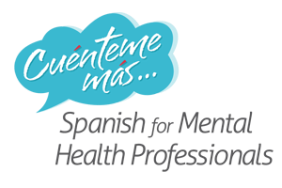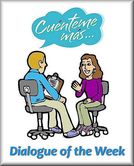by Cynthia M. Braden, LMFT
As we are working through a Psycho-Social Assessment or Diagnostic Interview with a Spanish speaking client, we are going to need the interrogative "¿Dónde?" in one main way:
1. Where something occurred
Let's use the formula of the same past tense (preterit) verbs that we used in the previous post, and ask Where? (¿Dónde?) instead of When? (¿Cuándo?) something occurred. These types of question constructions occur frequently in a Psycho-Social Assessment, and it's very helpful to be aware of, and memorize a few of them.
Simply form a question starting with "¿Dónde?" and use the preterit tense of the verb, similar to the last blog post when we were working with the question "¿Cuándo?" followed the same preterit tense of the verb.
Here are a few examples:
1. ¿Dónde nació usted? Where were you born? We are using the interrogative "¿Dónde?" for where something happened in the past. To be born is the verb 'nacer'. If we are asking about something that happened in the past, we need the Preterit tense, which is similar to past tense absolute. It happened on a singular occasion. The correct conjugation is in the 3rd person singular of nacer: nació.
2. ¿Dónde pasó eso? Where did that happen? Here introducing the verb 'pasar' we need the preterit tense 3rd person singular: "pasó". This is an extremely useful formula at times when you don't have immediate command of the conjugation of the verb you are needing. For example, Where did you fall? Where did that happen? Where did someone die, and/or any other action that you need to ask about. Using the generic "pasó" can really help your confidence, as you obtain the necessary information without stressing out trying to memorize numerous conjugations. It's beneficial to learn them all of course, but this technique is useful when you're not sure.
3. ¿Dónde se casó? Where did you get married?
4. ¿Dónde ocurrió eso? Where did that occur? As a client is delivering their narrative in the Assessment phase of therapy, they will be talking about things that happened in the past. There was a birth, a development, an education, a job, a family, some travel, conflicts, tragedies and triumphs during the experiences of that person.
5. Other examples of using '¿Dónde?' and various verb tenses:
¿Dónde ocurrió eso? When did that occur?
¿De dónde vinó used? Where are you from? (verb venir: to come)
¿Dónde vive usted? Where do you live (verb vivir: to live)?
¿Dónde trabaja? Where do you work? (verb trabajar: to work)
¿Dónde pasó eso? Where did that happen? (verb pasar: to happen)
¿Dónde sucedió eso? Where did that happen? (suceder: to happen)
In training programs, we have developed many 'formulas' such as these, to help you perform Psycho-Social Interviews and basic counseling interventions. This helps simplify and demystify the process of providing mental health services for Spanish speaking clients.
1. Where something occurred
Let's use the formula of the same past tense (preterit) verbs that we used in the previous post, and ask Where? (¿Dónde?) instead of When? (¿Cuándo?) something occurred. These types of question constructions occur frequently in a Psycho-Social Assessment, and it's very helpful to be aware of, and memorize a few of them.
Simply form a question starting with "¿Dónde?" and use the preterit tense of the verb, similar to the last blog post when we were working with the question "¿Cuándo?" followed the same preterit tense of the verb.
Here are a few examples:
1. ¿Dónde nació usted? Where were you born? We are using the interrogative "¿Dónde?" for where something happened in the past. To be born is the verb 'nacer'. If we are asking about something that happened in the past, we need the Preterit tense, which is similar to past tense absolute. It happened on a singular occasion. The correct conjugation is in the 3rd person singular of nacer: nació.
2. ¿Dónde pasó eso? Where did that happen? Here introducing the verb 'pasar' we need the preterit tense 3rd person singular: "pasó". This is an extremely useful formula at times when you don't have immediate command of the conjugation of the verb you are needing. For example, Where did you fall? Where did that happen? Where did someone die, and/or any other action that you need to ask about. Using the generic "pasó" can really help your confidence, as you obtain the necessary information without stressing out trying to memorize numerous conjugations. It's beneficial to learn them all of course, but this technique is useful when you're not sure.
3. ¿Dónde se casó? Where did you get married?
4. ¿Dónde ocurrió eso? Where did that occur? As a client is delivering their narrative in the Assessment phase of therapy, they will be talking about things that happened in the past. There was a birth, a development, an education, a job, a family, some travel, conflicts, tragedies and triumphs during the experiences of that person.
5. Other examples of using '¿Dónde?' and various verb tenses:
¿Dónde ocurrió eso? When did that occur?
¿De dónde vinó used? Where are you from? (verb venir: to come)
¿Dónde vive usted? Where do you live (verb vivir: to live)?
¿Dónde trabaja? Where do you work? (verb trabajar: to work)
¿Dónde pasó eso? Where did that happen? (verb pasar: to happen)
¿Dónde sucedió eso? Where did that happen? (suceder: to happen)
In training programs, we have developed many 'formulas' such as these, to help you perform Psycho-Social Interviews and basic counseling interventions. This helps simplify and demystify the process of providing mental health services for Spanish speaking clients.


 RSS Feed
RSS Feed



